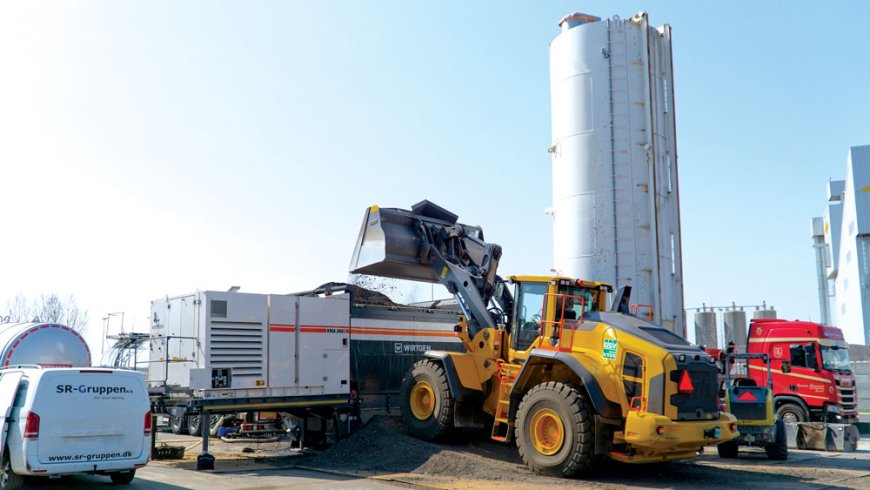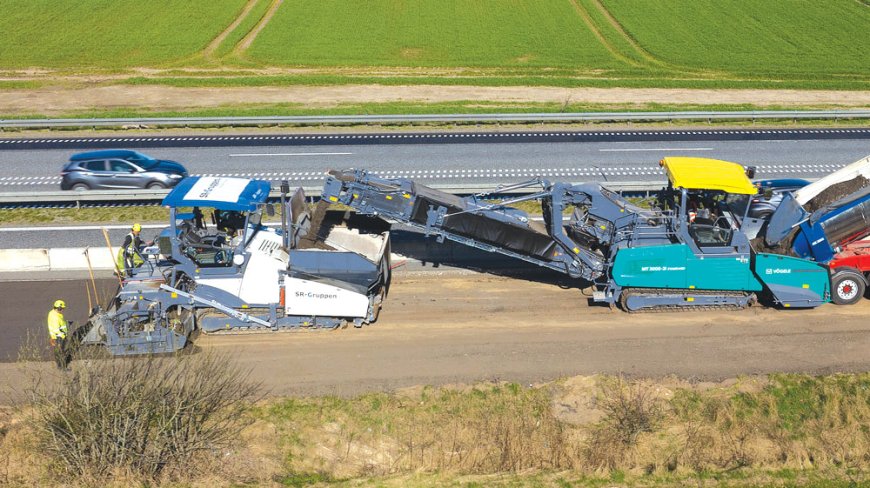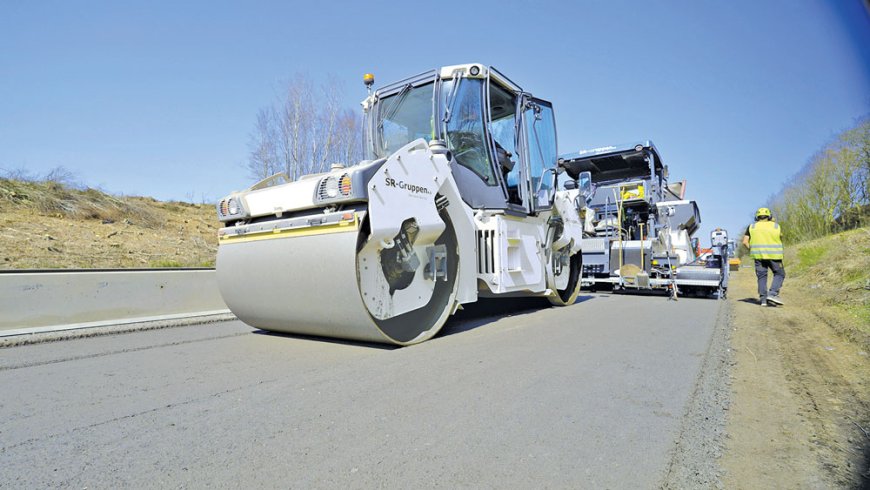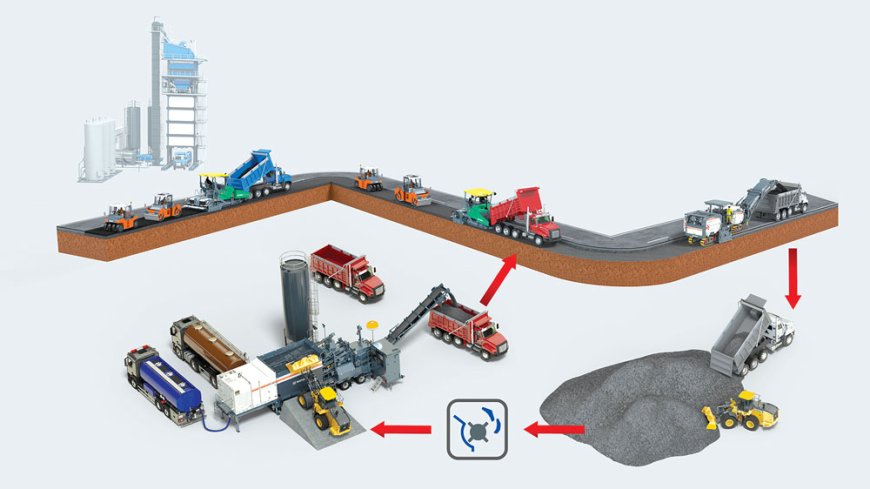Cold in-plant recycling: Road rehabilitation project in Denmark

A 6.5 km section of the European Route E 45 motorway not far from Denmark’s world famous Legoland theme park had to be completely rehabilitated in both directions. The tender for the job foresaw the paving of a 20 cm base layer with a cold mix produced by complete recycling of the material from the existing asphalt pavement. In addition to the cold recycling plant KMA 240i and large milling machines from Wirtgen, the contractor also deployed Vögele pavers and rollers from Hamm on the project.

Cost-efficient and environmentally friendly
Cold recycling of road surface material is the most sustainable construction method available for structural rehabilitation. Bituminous cold mix as used here for the new base layer is produced by the addition of foamed bitumen to milled material and has become established around the globe as an ideal material for paving roads of all load classes.
As the time window for the completion of the project was extremely tight, it was essential to ensure that everything and everybody worked hand-in-hand. “We produced up to 300 t of cold mix per hour with the KMA 240i,” reports Morten Wold, Divisional Manager at SR-Gruppen A/S.
The asphalt pavement of the E45 motorway was milled off to a width of between 3.15 m and 5.9 m and a depth of 28 cm by Wirtgen W 210i and W 250i large milling machines and transported to a KMA 240i mixing plant set up close to the project site. The mobile cold mixing plant enabled the contractor to stay close to the asphalt removal and paving location, which consequently minimised material transport requirements and significantly reduced the overall CO₂ emissions of the construction project. A suitability test was carried out on the reclaimed asphalt pavement (RAP) before the start of the construction phase. An ideally formulated mix was achieved by the addition of 2.2% of foamed bitumen, 6% of lime, and 0.8% of cement.

Precise dosing ensures ideal results
The milled asphalt material was first reduced to a particle size of 0-32 mm in an impact crusher and then tipped in to the high-capacity receiving hopper of the KMA 240i by a wheel loader, from where it was fed to the twin-shaft continuous mixer. The two feed augers of the double-trough system with precision weighing took care of the separate addition of lime and cement as binding agents. The KMA 240i from Wirtgen was upgraded especially for this project by the installation of an additional feed auger. The continuous weighing system ensured precise dosing of the required additives. The addition of the foamed bitumen was taken care of by the integrated, microprocessor-controlled injection system.
Construction without road closures
The bitumen-stabilised cold mix was loaded directly into 36.5 t tipping semi-trailers and immediately transported back to the construction site. Graders and Hamm rollers prepared had levelled and consolidated the frost protection layer beneath the milled off asphalt pavement beforehand to serve as a stable roadway for the pavers and trucks following on behind. A MT 3000-2i mobile feeder from Vögele served as a material feeder to ensure a smooth and seamless flow of material on the construction site. The MT 3000-2i has the ability to bunker large quantities of cold mix. As no complete road closures were permitted during the project, the material transport logistics involved were particularly challenging. The MT 3000-2i delivered the decisive leeway required for the complete rehabilitation of two lanes of the highway in a single pass without the need for road closures.
A Vögele SUPER 1900-3i paver paved the material true to grade and slope to create a 20 cm base layer of cold mix as the new basis of the busy motorway. Particular care was taken during the subsequent compaction process. A Hamm HD 120i tandem roller with an operating weight of over 12 t provided the required compaction. The thin cape seal surfacing was subsequently carried out by a Hamm GRW 280i pneumatic tyre roller.
After only two days, the paving team was able to lay down a binder course and a surface layer with a thickness of 8 cm. For this, the contractor chose a polymer-modified asphalt that caters for the special needs of the particularly busy lane for heavy trucks and perfectly compliment the base layer paved with cold recycling mix with foamed bitumen. The Vögele SUPER 1900-3i and MT 3000-2i again worked hand-in-hand on the completion of these tasks.

Project details
Length of section: 6,500 m
Width of section: all lanes, 20.45 m
Reduction of material transport requirements: >70%
Cold mix paved: 51,000 t
CO₂ reduction: >50%
Approximately 50% faster project completion
Pic captions:
Pic 1: The KMA 240i mobile cold mixing plant produced the bitumen stabilised cold mix from the reclaimed asphalt delivered from the construction site at a rate of 300 t per hour.
Pic 2: The paving of the 20 cm base layer of cold recycling mix was carried out by a Vögele SUPER 1900-3i and a MT 3000-3i Offset.
Pic 3: The consolidation of the base layer, the surface layer and the binder course were carried out by rollers from Hamm.
Pic 4: Schematic representation of a cold in-plant recycling construction site with short paths as used in the rehabilitation of the E45 motorway in Denmark.







